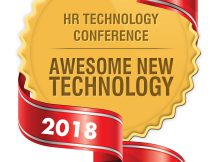#HRTechConf Update: Submissions Open for Awesome New Technology and Discovering the Next Great HR Tech Company
NOTE: I had an important HR Technology Conference update that I posted yesterday over on the the Conference's HR Tech Insiders blog, but I did want to cross-post here too, to make sure any and all interested HR technology companies and solution providers had the news. Thanks!
From HR Tech Insiders...
Attention HR Technology Solution Providers: Submissions to be considered for the annual HR Technology® Conference and Exhibition "Awesome New Technologies for HR" and "Discovering the Next Great HR Technology Company" sessions are being accepted and can be submitted on the HR Tech website HERE.
In case you are new to these sessions, here is what they are, how they work, and who is eligible for consideration for each session.
"Awesome New Technologies for HR" showcases larger, more established HR tech solution providers, (publicly traded, been in the market for several years, maybe running TV spots on CNBC, etc.), who are invited to submit their latest, most innovative solutions for consideration. These can be new modules for an existing platform, a reinvention of one or more of their solutions, or something totally new and unique in the HR tech market. During the summer, I will review, arrange demonstrations, and select 5 or 6 solution providers to present for 10 minutes on our main stage at HR Tech and be recognized as an "Awesome New Technology for HR" for 2018.
"Discovering the Next Great HR Technology Company" is for the startups, less-established, or emerging HR tech solution providers in the space, and works a little differently than "Awesome New Technologies." From the submissions we receive on our website, HR Tech works with a group of industry experts - George LaRocque, Principal Analyst and Founder of HRWins , Madeline Laurano, Founder and Principal Analyst of Aptitude Research Partners., Ben Eubanks, Principal Analyst of Lighthouse Research & Advisory, and Lance Haun, Practice Director for The Starr Conspiracy to select eight semi-finalist HR tech solution providers.
Then, during the summer our analyst coaches will work with the eight semi-finalists to hone their messaging and demonstrations, and will be posting videos and additional information about the semi-finalist startups.
In July and August we will be looking to you, the HR Tech Insiders audience, to vote online on the HR Tech Insiders site and help us select from these eight semi-finalists, the four finalists that will get to present to the audience at the conference in Las Vegas in September. And in a new wrinkle for 2018, the four finalists will be joined by a fifth company - the winner of the 1st Annual HR Technology Conference Pitchfest which will take place during the Conference. Finally, this will culminate in live demonstrations from the five finalists on our main stage after which Conference attendees will select the Next Great HR Technology Company for 2018 live in Vegas!
We encourage all interested HR technology solution providers for either session to submit an entry for consideration here. The application deadline is Friday, June 29th, so don't wait too long to submit.
I can't wait to review the submissions and see all the incredible HR technology innovation I know is out there!

 Steve
Steve



